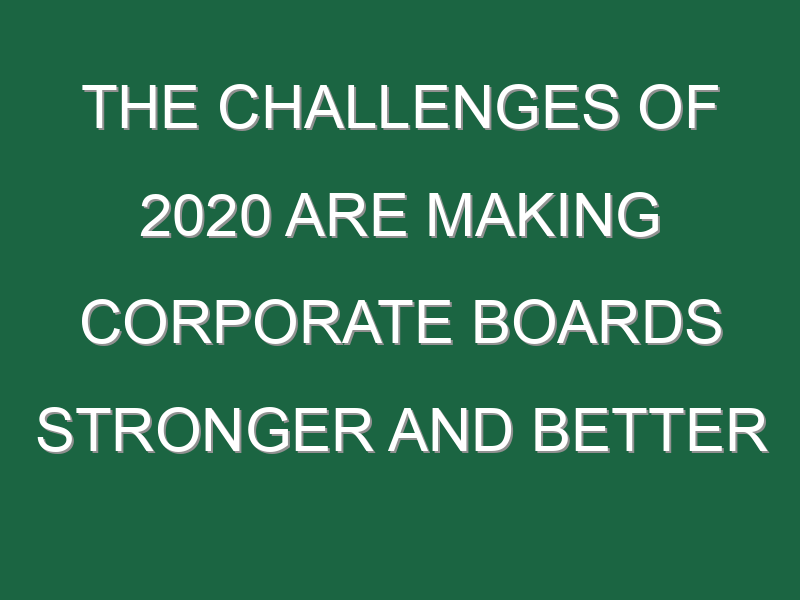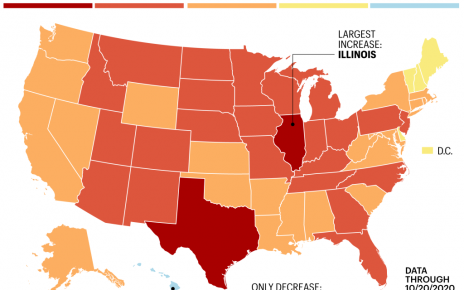The past year has been a time of extraordinary disruption. The world has seen immense upheaval—in public health, in the economy, across our societies, and in the way we live, work, and support one another.
As we look ahead to 2021 and the world embarks on the largest-ever vaccination effort to fight COVID-19, talk is beginning to shift to the return of “normal.” At Diligent, we’re seeing that conversation play out among the more than 700,000 board members and C-suite executives at organizations around the world with whom we partner to provide insights and technology. They are taking stock of the last year and making plans for the year to come.
One thing is abundantly clear: When it comes to governance and how corporations interact with the communities and societies they serve, the old normal simply will not suffice.
We have seen this paradigm shift in national conversations around racial justice; in the connective technology that has become a lifeline for our businesses and communities; and in the challenges facing working parents, a category that includes me and my wife, a Fortune 1000 CFO. Like millions of others, we’re working from home while also making time for family matters—collisions of personal and professional lives that have meant stepping away from board meetings to put kids down for a nap, or run to the pharmacy, or start dinner for the family.
The massive disruptions of 2020 have accelerated, augmented, and amplified several ongoing changes in corporate culture. These are changes we need to embrace and build on—among them, a shift toward greater leadership diversity, expanded use of technology to drive transparency and connection, and an increasing turn toward stakeholder capitalism.
One of the most obvious changes is the recognition that more perspectives must be embedded in decision-making at the highest levels. In boardrooms and C-suites around the world, diversity and inclusion are being transformed from buzzwords and pledges to reality. For example, more than 80% of executives surveyed by the Diligent Institute this fall in partnership with the NYSE indicated they are or soon will be planning to increase board diversity. The result is both more opportunity for extraordinary individuals and stronger, more effective, and more impactful companies.
At Diligent, we are proudly playing a role in that effort. To combat the tired excuse that there’s insufficient diverse talent, and to break old patterns that kept leadership searches within closed, homogenous social groups, earlier this year we leveraged our technology and our network to form the Modern Leadership initiative. This program taps into and expands the pool of board-ready talent from diverse backgrounds in order to make equity and inclusion a reality at the top, helping companies and boardrooms engage the skills and lived experiences of a broader leadership community.
The forced, sudden digitization experienced in 2020 has also fundamentally changed how corporate leaders view themselves and their relationship to their organizations. Businesses are flatter than ever in the work-from-home environment and boardrooms have simultaneously become more integrated with their companies. In perhaps the greatest paradox of 2020, the forced physical separation triggered by the pandemic has accelerated a move toward connectivity and transparency—and in turn, empathy. We have been inescapably reminded by a global health emergency that we are all connected, that we are in this together, and that the only way to make progress is to put our knowledge and skills to work for each other.
That’s something that I have felt firsthand—in the camaraderie of our team, in the way we approach problem-solving, and in the support we show for all members of our organization as we navigate this moment together.
That sense of connectivity can be felt not only within our organizations, but also in the way our companies operate on the global stage. The pandemic, its economic impacts, and the social and racial awakening that marked this year have driven corporate leaders to seek a more just form of capitalism. It has become undeniable that leaders must open the aperture when it comes to stakeholders, and irrefutable that they must strive for positive impact with customers, employees, partners, and the community writ large. Nearly 75% of the 400 corporate leaders we surveyed earlier this year now expect to discuss impacts of their decisions on non-shareholder stakeholders at least quarterly.
From PayPal’s recent commitment to raising employee wages, to Hewlett Packard Enterprise’s decision to reduce energy consumption, to Apple’s push for customer privacy protections, leaders are adjusting to this new reality in order to benefit workers, customers, and society.
But this is just the start. Leaders must keep pushing the envelope and shift the way they think about costs, benefits, overall purpose, and how they define and measure their commitments beyond the bottom line.
All these transformations were underway, to differing degrees, before the pandemic began, and many are still in early stages. But it is clear this moment of reckoning has catalyzed a greater sense of possibility and a more pronounced push for action that we should not abandon.
Large organizations are oftentimes slow to change, offering a lagging indicator of social innovation. But like a boulder beginning to roll downhill, those slow beginnings can presage gathering speed and momentum.
As we close the books on 2020 and as I look out across boardrooms and C-suites around the globe, I am heartened that even as the most acute effects of the pandemic on boardrooms and businesses draw to a close, the most impactful changes are just starting to unfold.
Brian Stafford is the CEO of Diligent Corp. and coauthor of Governance in the Digital Age.
More opinion from Fortune:
- Congress just passed the most important anti-corruption reform in decades, but hardly anyone knows about it
- Trump focused too much on fraud—and it might have cost him the election
- Why a key Georgia county flipped from red to blue—and what it means for Democrats
- After 2020, we all need a gap year
- Investors are starting to demand better of the companies they own



